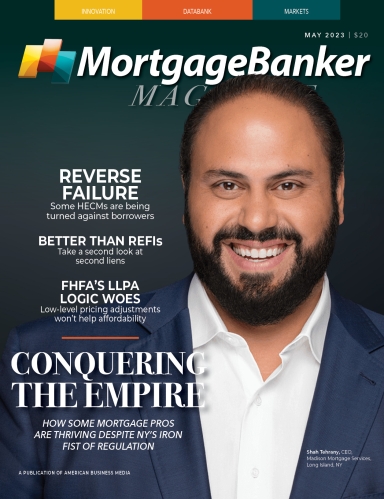For most brokers who began working in New York after 2008, it’s not easy. As detailed in an article in our sister publication, National Mortgage Professional Magazine, “I Hate New York,” there’s plenty of reasons why loan officers and companies avoid this state like the plague. But this aversion also creates an opportunity for brokers who are willing to put in the work and have patience dealing with the New York State Department of Financial Services (DFS).
Trust that it may be hard working in this particular state, but the brokers that do are far from miserable. Tehrany is one of United Wholesale Mortgage’s top broker partners, bringing in close to $400 million in volume last year, according to Modex, and a majority of his clients are located in New York.
Patience Pays Off
In New York it takes a while to get a broker license — anywhere up to 18 months, at times. First, Tehrany made the transition over to his friend’s company, helped him grow a little bit, and then filed for his broker license. Luckily, he was able to get it in nine months. Then he transitioned over to Madison Mortgage.
“New York loans are harder, there’s no question about it,” Tehrany said. “Predominantly just because of the demographics of this area, and the way that New York’s loan business is transacted where a purchase typically would take anywhere from 70 to 90 days to close.”
In markets like New Jersey, Maine and Connecticut, where Madison Mortgage does a lot of business, contract to closing can take 30 days.
Mainly, what causes the hold-up is the fact that every purchase transaction has to be overseen by three attorneys — the buyer’s attorney, the seller’s attorney, and the bank attorney. The loan officers perform with as much speed as loan officers elsewhere, but the coordination and logistics behind each transaction is more complicated.
“It’s just a much different game here in terms of how quickly you can get into contract and how long it takes to actually execute transactions,” Tehrany said.
Many of these more stringent regulations were implemented after the 2008 financial crisis. The banks needed to be strengthened to better protect borrowers and the mortgage industry from facing a similar collapse in the future.
“The New York [State Department of Financial Services] is amazing at these regulations and implementing them. And in New York, I mean, I think it’s one of the safest places right now to buy,” said A.S.A.P. Mortgage CEO Irene Amato. A.S.A.P. is based north of New York City in affluent Westchester County.
Similarly, Tehrany has an appreciation for the financial services department and believes these regulations are necessary to create a safer lending environment. He said the department does a good job of making sure that the people who do business there are responsible.
“I mean, it is the financial capital of the world, right? So, you know, they take it a little more seriously,” Tehrany said.
Originally, Tehrany worked on the retail banking side before transitioning to become a broker. One of the reasons he switched was because he noticed a demand for less conventional loan products and a lack of brokers in the community to help consumers navigate their options.








